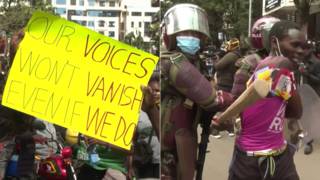Anti-government protests in Kenya are continuing after President William Ruto made a dramatic reversal Wednesday, announcing he would not sign the finance bill that sparked a nationwide uprising, and would instead send the bill back to Parliament. At least 23 people were killed and dozens more injured when police fired live rounds, rubber bullets and tear gas at protesters who stormed Kenya’s Parliament building. We speak to a writer and activist based in Nairobi who asked to remain anonymous out of fear for her safety. She says many in the youth-led movement have been “abducted” during the police crackdown on demonstrations, which are now calling for Parliament to be dissolved and new elections to be held. We also hear from Mamka Anyona, a Kenyan international finance and development expert, who breaks down the financial crisis that led to the mass unrest. The contested finance bill deploys a tax hike in an attempt to repay $80 billion in foreign loans, largely from the International Monetary Fund and the World Bank. But critics say mismanagement and corruption have led to high inflation and unemployment, and characterize both the bill and the loans themselves as undemocratic decisions reached without constituent approval. ”It has all ended up creating this tinderbox,” Anyona says.
Full article on the Democracy Now website at — http://www.democracynow.org/2024/6/27/kenya_update
Story imported via RSS from DemocracyNow.org
RSS Article Source: http://www.democracynow.org/2024/6/27/kenya_update

